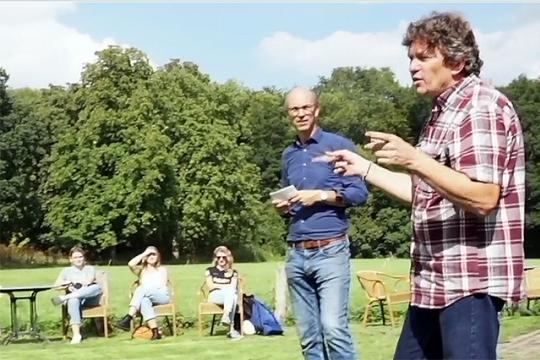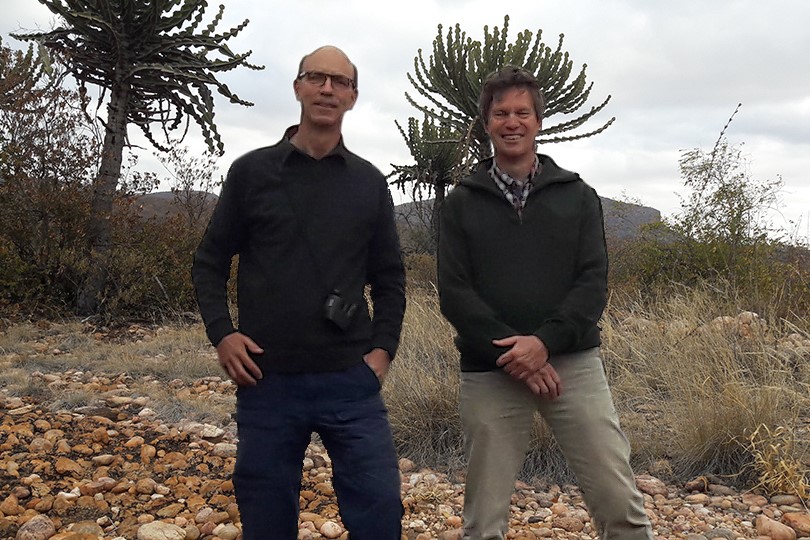Two organizational anthropologists see their research sinking deeper and deeper into a long hibernation. ‘We keep getting compliments on our commitment to education, but we also need perspective to shake up our slumbering research’, Harry Wels and Frans Kamsteeg wrote in a letter sent to Ad Valvas.
You took up your pen because you are exhausted?
Wels: “Well, it is indeed the result of a lot of video calling and a lot of attempts to make sure everything runs smoothly in terms of education. Rightly so, because students are suffering, they deserve a lot of attention, and education deserves a lot of attention. But I haven’t really seen doing research on the agenda for the past year, not at the department, not at the faculty, not at the university.”
Kamsteeg: “Of course we talk about it, but we just don’t get around to doing our own research. That is a hidden truth. Perhaps it is the type of researchers we are: especially for researchers who do fieldwork this is a very bad time. To a large extent, social science is about seeing people, speaking to them, experiencing them, with all your senses. But I think the research that is teamwork is badly affected by the pandemic. Partly because of the corona crisis itself, and partly because we give so much more time to continuing education for our students.”
Wels: “We get a lot of warm words, you know. The board does this [he makes a heart with his hands, ed.], the faculty board does this, we are all heroes by now. But we have not been able to conduct research for over a year. We want a gesture, and our proposal is to give researchers three months off education after the pandemic.”
But the students are behind in their studies, how can you start talking about an education-free period?
Wels: “This is also a backlog! And education also needs us to go back to doing research. A university combines research and teaching, and research informs education. So especially if you start sketching a future and say that the merit of corona is that we have finally invented online education and this will remain, I am very concerned about that.”
What exactly are you concerned about?
Wels: “That it’s so nice that we can do everything online, that pedagogically we don’t make any trade-off and just keep going online.”
‘Online education is pedagogically inferior. Yes, I dare say that out loud with double capital letters’
Because online education is pedagogically inferior?
Wels: “Yes, I dare say that out loud with double capital letters.”
Kamsteeg: “Also because our students would love to hear us say that. They hardly get out of bed for an online session: this is really hard for them. Not only education is online, everything is online. We think it’s disastrous for academic education if you only speak to each other online.”
Wels: “We’re currently compromising pedagogically. I think that’s sometimes overlooked a little bit too easily.”
So what can’t you do well through online education?
Wels: “The sensory. Proximity, physicality is part of our communication. Now we sit still in a chair, you only see each other’s bust and can’t move. I can’t interact like that. It’s all very two-dimensional.”
Kamsteeg: “Also, we only see each other in a professional context. Lecturing is also about bonding with your students outside of that. That doesn’t always work out with everyone, but chances are much greater when you really see each other. This year we even took that to the extreme, having seminars at the goat farm. There we had so much opportunity to see people. That’s where you see the difference being made.”

Wels: “And just the experience of happiness. No talking about grades, but just enjoying the fact that you are studying, that you can talk to each other, disagree with each other, laugh at a joke, drink coffee together. That human aspect is stripped in this way.”
About the education-free period. Who all should get that?
Wels: “Do you know who it also applies to incredibly? PhDs and postdocs who do our type of research, who are completely stuck and who do not get an extension of their appointment, they are even more screwed.”
Kamsteeg: “How can they build an academic career if they can’t do research? The board can’t help it that we are dealing with corona. But having an eye for this reality is what we are all about.”
But what about teaching if all researchers are exempt?
Wels: “Scheduling. Not everyone gets it right away. But if you’re talking about offering perspective, I don’t think that in the field of this type of research any perspective is offered. I already know what’s going to happen: corona will be over and we’ll just keep pummeling forward. And that I will have lost one and a half years of research is only a minor matter.”
Kamsteeg: “I’m sure that there are still managers to be found who can organize this, we write in our letter. That’s a bit ironic. Managers are busy, too: online education has to be organized as well. But of course it can be done. And if you want to make up for something, you will also have to put some money into it. Because if you have to catch up on your education at another time, it’s not compensation.”
Wels: “It will definitely improve job satisfaction, the feeling of work overload and overall appreciation.”
***
‘Better returns do not mean better teaching’
Wels, whose research focuses among other things on diversity in higher education in South Africa, talks about an initiative by his South African colleagues. They sent an open letter to various national newspapers in which they spoke out against university boards that consider online education such a good development and rejoice that the return figures are higher than ever before.
‘Underneath these cold return figures, lies an incredible amount of suffering’
Wels: “Colleagues of ours in South Africa want to warn that you shouldn’t see this as an improvement in pedagogy or better education. Because there is an incredible amount of suffering hidden beneath these cold return figures. Plus it mainly targets the people who do have good computers and are in an environment where you can get an online education with good wifi, access to books and online resources, which means that the apartheid that they thought they had abolished is coming back in part through online education.”
“I was moved by that message. They published the letter to warn against managerialism, like isn’t it wonderful that we can do all this online? Then we will have no nagging at the entrance and no protests; it may even cost less. We want to join such a message.”
Kamsteeg: “Of course we started this to get three months education-free, Harry. But this is the story underneath.”
Want to know more about Kamsteeg and Wels’ education? Then watch their video about ‘wild pedagogy’ on the goat farm.
